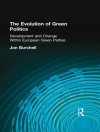In A Community of Europeans?, a thoughtful observer of the ongoing project of European integration evaluates the state of the art about European identity and European public spheres. Thomas Risse argues that integration has had profound and long-term effects on the citizens of EU countries, most of whom now have at least a secondary ‘European identity’ to complement their national identities. Risse also claims that we can see the gradual emergence of transnational European communities of communication.Exploring the outlines of this European identity and of the communicative spaces, Risse sheds light on some pressing questions: What do ‘Europe’ and ‘the EU’ mean in the various public debates? How do European identities and transnational public spheres affect policymaking in the EU? And how do they matter in discussions about enlargement, particularly Turkish accession to the EU? What will be the consequences of the growing contestation and politicization of European affairs for European democracy?This focus on identity allows Risse to address the ‘democratic deficit’ of the EU, the disparity between the level of decision making over increasingly relevant issues for peoples’ lives (at the EU) and the level where politics plays itself out—in the member states. He argues that the EU’s democratic deficit can only be tackled through politicization and that ‘debating Europe’ might prove the only way to defend modern and cosmopolitan Europe against the increasingly forceful voices of Euroskepticism.
Tabella dei contenuti
Introduction: The Europeanization of Identities and Public Spheres Part I. An Emerging European Identity?
1. Collective Identities: Conceptual and Methodological Questions
2. Multiple Europes: The Europeanization of Citizens’ Identities
3. Modern Europe and Its Discontents: The Europeanization of Elite Identities
4. Europeanization of National Identities: Explanations Part II: An Emerging European Public Sphere?
5. Transnational Public Spheres: Conceptual Questions
6. The Gradual Europeanization of Public Spheres
7. A European Community of Communication? Part III: Consequences
8. ‘Deepening’: European Institution-Building
9. ‘Widening’: EU Enlargement and Contested Identities
10. European Democracy and Politicization Conclusions: Defending Modern EuropeReferences
Index
Circa l’autore
Thomas Risse is Professor of International Politics, Otto Suhr Institute for Political Science, Freie Universität Berlin. He is coeditor of The End of the West? Conflict and Change in the Atlantic Order, also from Cornell, and author of books including Cooperation among Democracies: The European Influence on U.S. Foreign Policy.












